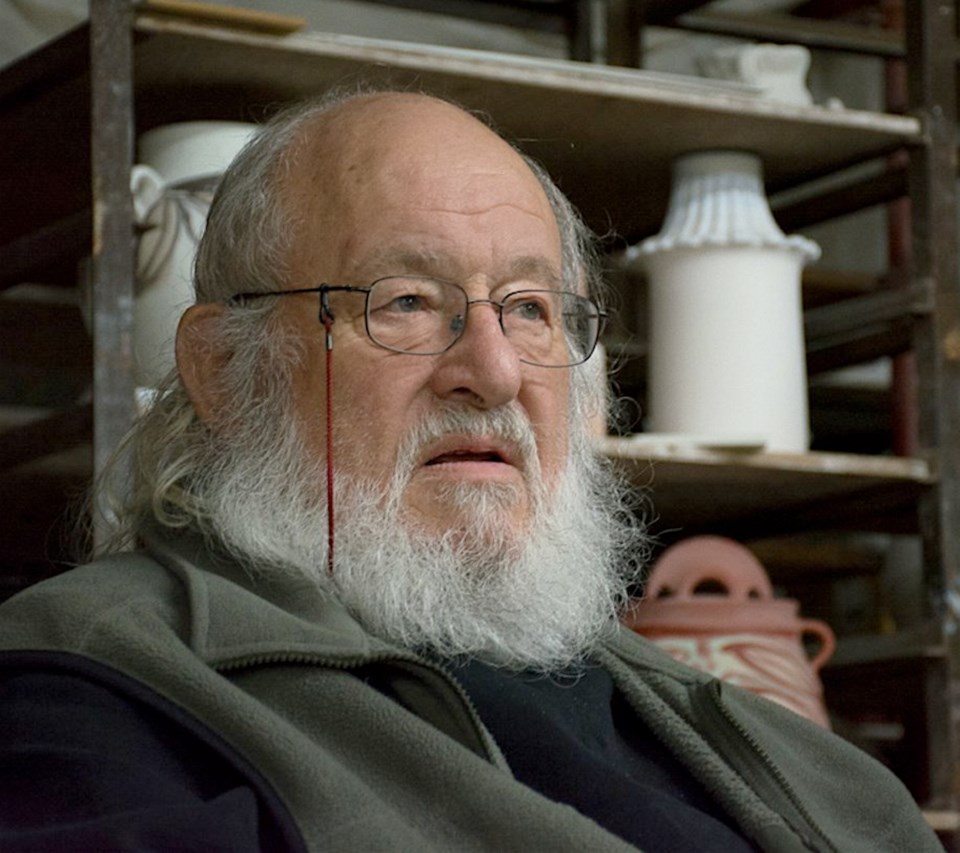Metchosin potter Robin Hopper was nothing if not frank in writing his own obituary.
Hopper, who died April 6 at the age of 77, described himself as “a man of many parts, mostly worn out, rusty and dysfunctional due to a lifetime of excesses!”
He said he enjoyed “a convoluted life’s journey” and left it with a giant smile. “Best wishes and thanks to all who made this life such a pleasure,” wrote Hopper, who earned many accolades for his work as a potter, including being named a member of the Order of Canada in December. The honour came for contributions to his field through the introduction of a number of innovative techniques.
Hopper wrote that he began working with clay at the age of three, and from there enjoyed a “lengthy, peripatetic career as a mud-pusher.”
He tried many other pursuits along the way, he said, including stints as a professional actor, jazz musician, geologist and alchemist. He also became known for the one-hectare garden he created in his yard, which inspired the ebook A Potter’s Garden — An Artist’s Approach to Creative Garden-Making.
Hopper had been living with inoperable liver cancer for about two years and passed away in hospice, said his wife, Judi Dyelle, also a noted potter. She said he was able to enjoy time with family just before he died.
“He’d been out with his daughter having lunch the day before and with his son the day before that.”
He leaves three children, two stepchildren, 10 grandchildren and many other relatives.
Hopper was born in England in 1939 and was a young boy during the Battle of Britain — he remembered hot shrapnel and blue clay as playthings in the absence of toys. He made his way to Toronto in 1968 and then to Victoria in 1977.
Dyelle, who ran ’Chosin Pottery on Metchosin Road with Hopper, said he not only created sought-after pieces of art but travelled frequently around North America giving workshops. He and Dyelle also started the Metchosin International Summer School of the Arts at Pearson College.
After his cancer diagnosis, he began working on what he called his “Swansong” video, Dyelle said.
“He felt that there was still some things he hadn’t really had a chance to put out there, so part of the Swansong is things that he’s done in the past,” she said. “It’s just a culmination of him, I guess.”
Dyelle said she was happy to see Facebook messages for Hopper from people who had never met him but were thankful for his books or DVDs.
A Facebook post from his family said Hopper’s parents encouraged him “to leave the world a better place than he found it.”
“We think it is fair to say that he has definitely accomplished that beyond expectations,” the family said. “He lived a rich life and made a significant impact on many people. He brought beauty to the world with his pots and his garden.”
His work earned him a place in the University of Victoria’s special collections and archives.
“He was an artist, he was an educator, he was a writer — he certainly made very significant international contributions to the world of ceramics and ceramics education,” said Lara Wilson, UVic director of special collections and archivist, noting the archives contains Hopper’s correspondence, manuscripts to his textbooks, information about his awards and his work as a ceramics historian.
Hopper had a well-deserved reputation in his field, Wilson said.
“His profile internationally was, I think, pretty much unparalleled in terms of the development of ceramics and design and educating fellow ceramacists about the art.”



